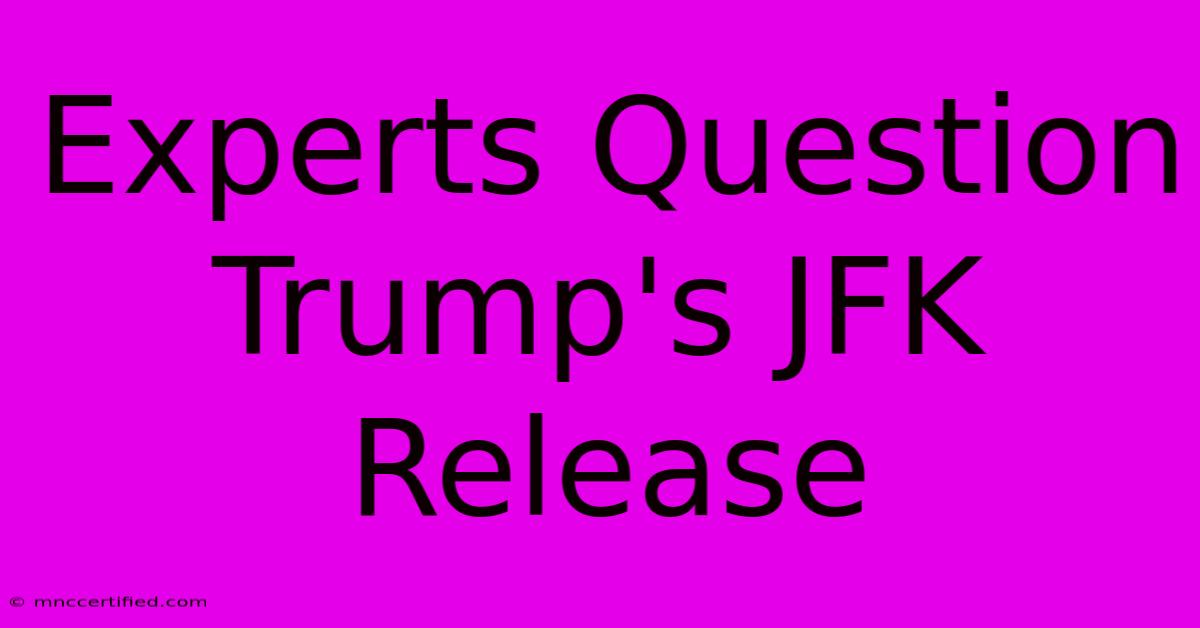Experts Question Trump's JFK Release

Table of Contents
Experts Question Trump's JFK Release: A Deep Dive into the Newly Released Files
The recent release of classified documents related to the assassination of President John F. Kennedy, authorized by former President Donald Trump, has ignited a firestorm of debate and renewed scrutiny. While touted as a significant step towards transparency, many experts question the true scope and impact of the release, raising concerns about its completeness and potential for obfuscation. This article delves into the controversies surrounding the release, examining the perspectives of leading historians and investigators.
The Trump Administration's Decision: A Controversial Move
The release, initially promised as a comprehensive unveiling of all remaining JFK assassination files, fell short of expectations for many. While a significant number of documents were declassified, numerous others remain withheld, citing national security concerns. This selective release has fueled skepticism, leading experts to question the administration's motives and the true extent of transparency achieved. The selective nature of the release is a major point of contention. Historians argue that withholding crucial information undermines the very purpose of the release, hindering a comprehensive understanding of the events surrounding JFK's death.
National Security vs. Public Transparency: A Balancing Act?
The primary justification for withholding documents has been the protection of national security. However, critics argue that this justification is often overused and serves as a convenient shield to prevent the disclosure of potentially embarrassing or damaging information. Finding the appropriate balance between national security concerns and the public's right to know remains a central challenge. The debate highlights the complex ethical and legal considerations inherent in managing classified information related to such a pivotal historical event.
The argument extends beyond simple secrecy. The very definition of "national security" in this context is debatable, with some arguing that the continued withholding of information actively undermines public trust in the government. This lack of trust fosters conspiracy theories and fuels the very distrust the government claims to be protecting against.
Key Concerns Raised by Experts
Leading historians and assassination researchers have voiced several key concerns:
-
Incomplete Picture: The selective release leaves significant gaps in the historical record, preventing a complete understanding of the events surrounding the assassination. Experts emphasize that a truly transparent process would require the release of all relevant documents, regardless of potential embarrassment.
-
Redactions Too Extensive: Even within the released documents, redactions are often extensive, obscuring critical details and rendering parts of the documents largely useless for researchers. This raises concerns about the efficacy of the review process and the commitment to genuine transparency.
-
Lack of Context: The release of documents without sufficient context can be misleading and even harmful. Experts highlight the need for detailed explanations and analysis to guide the interpretation of potentially ambiguous information.
-
Delayed Release: The repeated delays in releasing documents, even after deadlines set by Congress, further fuels distrust and suspicion. This lack of adherence to established timelines undermines the credibility of the process.
Conspiracy Theories and the Impact of the Release
The incomplete nature of the release has inevitably fueled existing conspiracy theories surrounding the JFK assassination. The lack of complete transparency provides fertile ground for speculation and reinforces suspicions that crucial information is being deliberately concealed. This underscores the importance of complete and transparent disclosure in addressing historical events of this magnitude.
Moving Forward: The Path to Truth and Transparency
The release of the JFK assassination files, while a step in the right direction, ultimately falls short of providing the complete transparency demanded by the public and historians. Moving forward, a concerted effort is needed to ensure that all relevant documents are released, with minimal redactions, providing the necessary context for proper interpretation. This requires a fundamental shift in perspective, prioritizing public access to information over concerns about potential embarrassment or political fallout. Only then can we hope to achieve a truly comprehensive understanding of the assassination of President John F. Kennedy.

Thank you for visiting our website wich cover about Experts Question Trump's JFK Release. We hope the information provided has been useful to you. Feel free to contact us if you have any questions or need further assistance. See you next time and dont miss to bookmark.
Featured Posts
-
Review A Bewitching Wicked
Nov 23, 2024
-
Dental Bonding Gap Before After
Nov 23, 2024
-
Expanded F1 Grid Closer With Gm
Nov 23, 2024
-
F1 Las Vegas Grand Prix 2024 Live
Nov 23, 2024
-
Secured Transactions Flow Chart
Nov 23, 2024